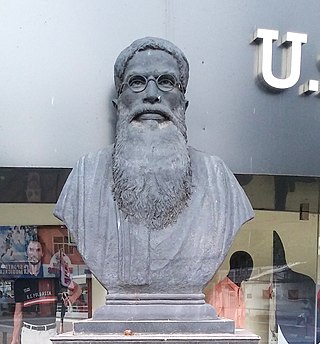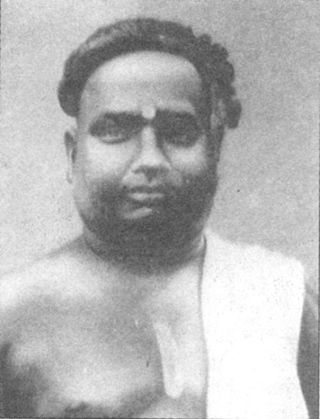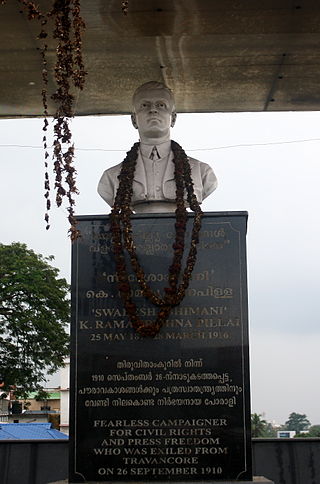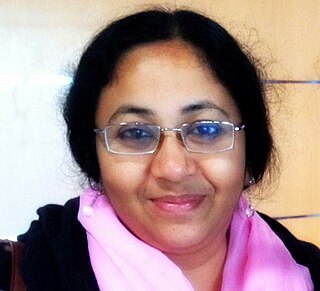Related Research Articles
Malayalam journalism encompasses journalism published and broadcast in the Malayalam language. Modern Malayalam journalism can be traced to the publication of the Raajyasamaachaaram and the Pashchimodhayam under the direction of Hermann Gundert in June 1847. Kerala has the highest media exposure in India with newspapers publishing in nine languages, mainly English and Malayalam.

Kizhakke Potta Kesava Menon was a patriot, idealist and Indian independence activist. Menon was the founder of Mathrubhumi, a popular daily newspaper which earned the second place in circulation in Kerala. In 1924, he led the Vaikom Satyagraha in Travancore. He was awarded the third highest civilian honour, Padma Bhushan, by the Government of India in 1966. He was conferred with an honorary doctorate (D.Litt) posthumously by University of Calicut in 1987.

Akathoot Balakrishna Pillai (1889–1960), better known as Kesari Balakrishna Pillai, was a Malayalam writer, art and literary critic and journalist, considered by many as one of the most influential thinkers of modern Kerala. He was the eponymous founder of the newspaper, Kesari and was one of the three major figures in modern Malayalam literary criticism, along with Joseph Mundassery and M. P. Paul. Besides works such as Kesariyude Lokangal, Navalokam, Sankethika Nirupanangal Sahitya Nirupanangal, Rupamanjari, he also wrote a text in English under the title, Outlines of the Proto-Historic Chronology of Western Asia.

Kerala poet and Indian poet

Kanakku Chembakaraman Kesava Pillai (1868–1914) was an Indian composer of Carnatic music and a poet of Malayalam literature. He was the Poet Laureate of Travancore and was known for Kesaveeyam, a mahakavya in Malayalam, two attakathas and several bhajans and kirtans. He also translated the Sanskrit text, Narayaniyam, into Malayalam under the title, Bhashanarayaniyam.

Indulekha is a Malayalam novel written by O. Chandu Menon. Published in 1889, it was the first major novel in the Malayalam language. It was a landmark in the history of Malayalam literature and initiated the novel as a new flourishing genre. The novel is about a beautiful, well-educated lady of a Nair tharavad.

Cannankara Velayudhan Raman Pillai, also known as C. V., was one of the major Indian novelists and playwrights and a pioneering playwright and novelist of Malayalam literature. He was known for his historical novels such as Marthandavarma, Dharmaraja and Ramaraja Bahadur; the last mentioned considered by many as one of the greatest novels written in Malayalam.

K. Ramakrishna Pillai (1878–1916) was an Indian nationalist writer, journalist, editor, and political activist. He edited Swadeshabhimani, the newspaper which became a potent weapon against the rule of the British and the erstwhile princely state of Travancore and a tool for social transformation. His criticism of the Diwan of Travancore, P. Rajagopalachari and the Maharajah led to the eventual confiscation of the newspaper. Ramakrishna Pillai was arrested and exiled from Travancore in 1910. Vrithantha Pathra Pravarthanam (1912) and Karl Marx (1912) are among his most noted works in Malayalam, Vrithantha Pathra pravarthanam being the first book on journalism in Malayalam and Karl Marx, the first ever biography of Karl Marx in any Indian language. But it has been alleged that he plagiarized the biography from an essay, Karl Marx:A Modern Rishi, by Lala Hardayal, published in 1912 March issue of the Modern Review, published from Kolkata.
Swadeshabhimani was a newspaper published in the Kingdom of Travancore, which was banned and confiscated by the Government of Travancore in 1910 due to its criticisms against the government and the Diwan of Travancore, P. Rajagopalachari.

Kudiyirikkal Narayanan Ezhuthachan, commonly known as Dr.K.N.Ezhuthachan was an Indian writer and scholar of Malayalam literature. He was one among the principal followers of the idea of social impact on literature. Ezhuthachan supported Marxist literary criticism and interpreted Indian literary works based on Marxist aesthetics. He won the Sahitya Akademi Award for his work Keralodayam, a long narrative poem written in Sanskrit. He is the first Malayali to win Sahitya Akademi Award in sanskrit literature. He died on 28 October 1981 while delivering a lecture at Calicut University.

Alappat Sreedhara Menon, known as A. Sreedhara Menon, was an Indian historian from Kerala. He is best known as the State Editor (1958–68) of Kerala District Gazetteers (1961–1975). He served as registrar of the Kerala University from 1968 to 1977, before retiring in 1980.
Mancherath Thazhathethil Govindan (1919–1989) was an Indian writer of Malayalam literature and a cultural activist from Kerala, India. He was known for his writings as well as for his efforts in assisting Anand to publish his debut novel, Aalkkottam, and in the production of Swayamvaram, the debut movie of Dadasaheb Phalke laureate, Adoor Gopalakrishnan. His body of work comprises short stories, poems, articles and plays. He also wrote the screenplay for Nokkukuthi, a 1983 film by Mankada Ravi Varma.

Newspaper Boy is a 1955 Indian Malayalam-language drama film. It is the first neo-realistic film in the language. The film narrates the life of the common man on the street. It is noteworthy in that the entire production programme from script-writing to direction was controlled and executed by students. The group of students were from the school Adarsh Kalamandir and the film was written and directed by P. Ramdas. The screenplay was based on a short story written by Ramadas himself.
K. S. Narayanaswamy, was a Carnatic veena exponent of the Thanjavur style, in which nuances and subtleties are given more importance over rhythm based acrobatics. He was awarded the Madras Music Academy's Sangeetha Kalanidhi in 1979.

Jayakumari Devika is a Malayali historian, feminist, social critic and academician from Kerala. She currently researches and teaches at the Centre for Development Studies, Thiruvananthapuram as a Professor. She has authored several books and articles on gender relations in early Kerala society. She is bilingual and has translated both fiction and non-fiction books between Malayalam and English. She also writes on gender, politics, social reforms and development in Kerala on publications like Kafila, Economic and Political Weekly and The Wire.

Kurissery Gopala Pillai was an orientalist, researcher, lexicographer, poet, essayist, grammarian and scholar of Malayalam and Sanskrit languages. He specialised in Comparative study of languages.
Annie Thayyil, was an Indian novelist, journalist, translator and biographer of Malayalam language and a member of the Cochin Legislative Council between 1945 and 1948. Her oeuvre comprises 78 books covering the genres of novel, biography, politics, travelogue and biblical literature. She was the secretary of the Sahitya Parishad and a member of the executive council of the Kerala Sahitya Akademi.
B. Kalyani Amma was a writer, editor, teacher and social reformer from Kerala. Kalyani Amma's most notable work is Vyazhavatta Smaranakal and Ormayil Ninnum (Reminiscences). She was one of the editors of two of the earliest magazines published for women in Kerala, Sharada and Malayalamasika. Kalyani Amma was the wife of Swadeshabhimani K. Ramakrishna Pillai, a political writer, journalist and editor.
Prof. Panmana Ramachandran Nair was a Malayalam language writer, translator, linguist and academic from Kerala, India. He has received Sahitya Akademi Translation Prize and Kerala Sahitya Akademi Award for Overall Contributions in the field of Malayalam literature. His autobiography Smrithi Rekhakal was published in 2010.
K. Chinnamma was a feminist, social worker and woman activist from Kerala, India. In 1918, she started Raja Sreemoolam Thirunal Shashtyabda Poorthi Smaraka Hindu Mahila Mandiram, Kerala state's first home for destitute women. She founded the institution with the aim of educating, empowering and rehabilitating girls from less privileged backgrounds, irrespective of religion or caste.
References
- ↑ Rekha, P. (2016). Women and Journalism in Colonial Kerala. Kalady: Department of History, Sree Sankaracharya University of Sanskrit. pp. 84–86.
- ↑ "Editorial". Sharada. 1: 3.
- ↑ Kumari E.K., Swarna (2001). "WOMENS' MAGAZINES IN KERALA AND THEIR SOCIAL SIGNIFICANCE". Proceedings of the Indian History Congress. 62: 705–708. ISSN 2249-1937.
- ↑ Awaya, Toshie (2003). "Becoming a 'Female Citizen' in Colonial Kerala". Gender and Modernity: Perspectives from Asia and the Pacific. Kyoto University Press and Trans Pacific Press. pp. 41–60.
- 1 2 Priyadarsanan, G. (2017). Masikapatanangal (in Malayalam). Kottayam: Sahithya Pravarthaka Co-operative Society Ltd. p. 80.
- ↑ The Travancore Almanac & Directory 1921. Thiruvananthapuram: Government Press. 1921.
- ↑ The Madras Year Book 1923 with an Official, Commercial and General Directory of the Madras Presidency. Madras: Government Press. 1923.
- ↑ "Women's History: An Overview of Early Malayalam Periodicals for Women". Samyukta: A Journal of Gender and Culture. 31 July 2020. Retrieved 22 April 2022.